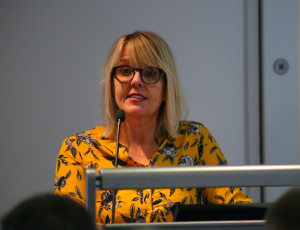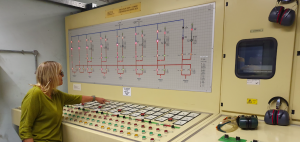‘Perfect storm’ brewing in Technology, warns CWU, as challenges stack up on multiple fronts
Telecoms & Financial Services, BT July 8 2020
TV Control Room in BT Tower
Wednesday 8th July 2020
With tensions rising in BT Technology amid management stonewalling on redeployment associated with the division’s ongoing transformation programme – even before the full impact of an unprecedented site rationalisation programme really becomes clear – the CWU is urging members to prepare for tumultuous times ahead.
CWU national officer Sally Bridge explains: “Since October we’ve been wrestling with the interlinked job security challenges that have been thrown up by automation and the business’s transformation programme.
“The CWU has worked hard to try to ensure that time-honoured redeployment processes are properly followed and that people are not just supported through the process but also that adequate training and re-skilling programmes are provided in this period of unprecedented change.
“Sadly, however, management’s response has been woefully inadequate. Not only have the union’s efforts to defend the interests of members been hampered by the lack of a coherent and joined-up approach within Technology itself, but that has been exacerbated by a complete lack of co-ordination between different BT Group lines of business.”
Citing the plight of 30 loyal team member grade redeployees in Technology who are currently desperately seeking alternative work, Sally continues: “Following the closure of the Network Operations Centre (NOC) in Newcastle we had a situation where a significant number of our members believed there would be jobs in Openreach which have simply not materialised. That’s because, unbeknown to any of us initially, Newcastle is not going to be one of Openreach’s long term sites under that division’s own site rationalisation programme.
“At present the largest group of redeployees in Technology by far come from the closed Newcastle NOC, with several more from the former NOC at Baynard House in London which also closed in phase one of the NOC consolidation programme. Many months later these individuals are understandably frustrated at the lack of progress and multiple setbacks they have received.

Sally Bridge
“The CWU is leaving no stone unturned to try to fathom out what the precise barriers to redeployment are – especially in the wake of deeply perturbing feedback we’ve received suggesting that time-honoured pay & pension protection arrangements are sometimes being viewed by recruitment managers as a deterrent.
“However, with transformation and automation gaining pace in Technology, and an already serious redeployment challenge in the division certain to be made exponentially worse by looming ‘Better Workplace’ programme site closures both in Technology and elsewhere, all these issues look set to come together in a perfect storm.”
At present Technology’s 8,000 impacted employees (including managers) are dispersed across nearly 400 sites – but under the division’s eye-wateringly ambitious ‘Better Workplace’ proposals that were unveiled in March, the business will consolidate into just six ‘UK hubs’ plus a number of ‘Specialist Buildings’ focussing on a single function.
From the outset the CWU branded the plan “simply unacceptable” – warning that hundreds of members will be left“stranded” by the impending site cull – yet despite three months of intensive efforts to engage with management to mitigate the impact, to date every single one of the union’s counter proposals have been rejected. (See story here)
Sally concludes: “In the context of the difficult times that lie ahead, it’s essential that members understand the complex and inter-related set of challenges we face, and the huge efforts already being made by the union’s Technology national team to protect members’ interests against an unprecedented onslaught.”
Key areas of CWU attention:
NOC consolidation
While last year’s closures of the Newcastle and Baynard House Network Operations Centres still account for most of Technology’s 30 redeployees – even after the majority of the displaced staff opted for a voluntary leave package – the NOC consolidation programme is not yet over.
“I think it’s generally known that Technology is gradually moving towards centralising its NOC operations– so while the work previously conducted at the closed Newcastle and Baynard House NOCs has moved to Adastral Park and Cardiff, this is just the first phase of what appears to be a longer-term process of consolidation to Adastral Park,” explains CWU Technology national team chair Ken Woolley.
“The timescale remains unclear, but clearly the implications are potentially serious for significant numbers of our members conducting NOC work in different parts of the country, and that is why it’s so important that we defend time-honoured agreements covering redeployment protocols that have served BT Group well for decades.
“The CWU has been strenuously arguing that, especially in a post-COVID-19 world, the wisdom of a NOC consolidation that puts all the eggs in one basket should be reconsidered, but that has been falling on deaf ears.”
Automation/ Transformation
With the Public Switch Telephone Network due to be switched off in 2025, and the writing on the wall for various other legacy platforms as we accelerate towards a fully fibre network, it’s clear that an unprecedented period of transformation lies ahead for members across Technology.
“We all know that automation is on the cards – it always has been and always will be – but the difference now is the scale and speed of the transformation that is underway,” explains Technology national team chair Ken Woolley.

Ken Woolley
“The scale of the challenge is illustrated by the fact that once fibre takes over there will only be around 1,400 of the 4,000-odd telephone exchanges we currently have left. Some of the buildings will still be there, but there won’t be anything physically done within some of them as we move into more of a network function/cloud based technology running the network.
“Change on this scale is going to mean that many of the roles conducted by our members in Technology are going to change beyond all recognition – and that throws up not just a redeployment challenge of massive proportions but also places a new focus on the importance of training and re-skilling.”
Training and re-skilling
Despite concerted CWU efforts to promote the importance of establishing top notch training and re-skilling programmes across Technology’s various business units, the company’s response to date has been patchy at best.
Technology national team chair Ken Woolley explains: “Over the last few months we’ve met with most of the business unit directors, amongst other things impressing the importance of training and re-skilling. In some areas they’re making the right noises – talking about ‘doing what they can’.
“The fear, however, is that warm words on training and re-skilling can easily become just a tick-box exercise – because currently it is only the IT business unit that really seems to have a highly thought-out approach towards training.”
COVID-19/ homeworking
Another bone of contention with Technology at present involves the determination of some parts of the business to enforce a far swifter return to office-based working than is being proposed in most other parts of BT Group
“In certain parts of Technology – notably in Dynamic Infrastructure – management are insisting that people return to work, whereas the message from Group HR and employee relations is that individuals should continue to work from home in so far as that is possible,” explains Technology national team chair Ken Woolley.
“At the very least there are mixed messages – but the apparent contradictions in Technology’s approach to homeworking is especially concerning given the huge redeployment challenges that look certain to be thrown by site rationalisation.
National team member Simon Edwards, who is also branch secretary of the Mid Wales, the Marches and North Staffs branch – which covers the Oswestry site, which does not feature in the company’s Better Workplace blueprint – agrees: “The pandemic has shown that homeworking is a viable option for the workplace of the future,” he stresses.
“ BT’s and Technology’s dogmatic approach to big centralised sites, with little concern for the workforce, is a kick in the teeth to those people who have kept the country connected while working from home during this unprecedented period that we have been through.”
Pointing out that ‘working together’ and ‘collaboration’ are constantly cited by the business as key reasons for the looming centralisation that could see hundreds of loyal employees displaced into an uncertain future – just at a time when BT is already making compulsory redundancies in its Enterprise division – Simon stresses the irony of the company demanding physical attendance at centralised key sites by its UK workforce given its heavy reliance on offshore resource.
“With thousands of jobs in India it would seem you cannot ‘collaborate’ from 50 miles away but you can from 4,500 miles,” Simon wryly observes.
Impasse on HV power allowance

Sally Bridge in the high voltage power control room in Manchester’s Dial House
The CWU is continuing to press the case for engineers conducting high voltage power work to be paid a special allowance in recognition of the additional skills and responsibilities involved.
Despite more than a year of stonewalling by management, the demand for such an allowance – which stems from a Coventry Branch motion that was carried at the union’s 2019 Annual Conference in Bournemouth – is still very much a live issue for the Technology national negotiating team.
“Following the 2019 Annual Conference decision we’ve attended a joint presentation with senior management where our members demonstrated the exceptional responsibilities they shoulder when conducting routine maintenance on the extremely high voltage supply’s that power not only our big buildings but which, in turn, power the entire network,” explains national team chair Ken Woolley.
“It’s frustrating, because I think we got our message across that these guys are working on supply’s running on up to 11 KV (kilovolts) and that, in some instances, buildings even have their own sub-power stations.
“We’re not giving up on the matter, however, and our latest reminder about this outstanding issue was delivered to management late last month.”
And now for the good news…
Despite the many difficult headwinds being negotiated by the CWU in Technology, the union has been involved in a number of grading successes in recent months – resulting in seven members being upgraded from C3 to D1 pay levels, all receiving an element of back pay too.
All the individuals whose cases have already been successfully championed by the union – and a couple more in the pipeline – are employed in highly skilled technical roles.
❗ Given the increasingly strained industrial relations outlook across BT Group, members across Technology are urged to inform the CWU of any changes to their membership details – including changes of address or personal email accounts.
There are three different ways to update your membership details:
- Log into the members’ only section of the CWU website using the username and password you have previously been sent, and change your own details.
- Contact your branch secretary to provide them with your new details.
- Email your new details to membership@cwu.org who will make the changes necessary. Please provide your membership number.

